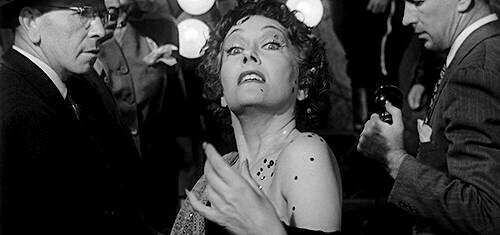A new year on Sunset Boulevard

“All right, Mr. DeMille, I’m ready for my closeup.” – Gloria Swanson as silent screen star Norma Desmond about to deliver one of cinema’s most famous lines.
If I were tasked to name the bedrock films of American cinema, Billy Wilder’s 1950 Sunset Boulevard would have to be among them for many reasons, not least of which is how it portrays the tinsel factory that it is a part of.
I recently rewatched it just to get into the New Year spirit, for the New Year promises many things for protagonist Joe Gillis (William Holden).
Who can’t love a movie that begins at the end and features wry commentary from a dead man?
The film begins with a tense, throbbing score by Franz Waxman (he won a well-deserved Oscar for it).
We see the title, stenciled on a sewer grate. We get the credits, and then the camera pulls up, looking down Sunset Boulevard, and we hear a police siren wailing. Soon a squad of wailing police cars are driving past and we hear a disembodied voice – Joe Gillis – tell us it’s 5 am and the homicide squad is on its way to an “old-time” star’s house where a murder has been committed.
“Before you hear it distorted and blown all out of proportion, maybe you’d like to hear the facts, the whole truth. If so, you’ve come to the right party.”
By now the police have arrived at the star’s mansion and have found a man’s body floating in the pool – two shots in the back and one in the belly.
“Nobody important,” the voice tells us. “Just a movie writer with a couple of B pictures to his credit. The poor dope. He always wanted a pool. Well, in the end, he got himself a pool. Only the price turned out to be a little high.”
The voice is that of the dead man, Joe Gillis. He then takes us to the start of the story, when he first happened upon the dilapidated mansion while trying to elude a couple of repo men intent on reclaiming his car. During the chase, a tire blows and he pulls into the mansion driveway, notices an empty garage, thinks the mansion is deserted, so pulls into the garage.
Gillis describes is as a “Miss Havisham kind of place, taking it out on the world because she’d been given the go-by.”
If only he knew how true those words.
He’s discovered by a creepy butler (Wilder’s fellow Austrian, Erich von Stroheim as former silent film director Max von Meyerling).
He asks why Gillis is so late, and wonders why he is not properly dressed for the occasion. The curious Gillis follows the butler into the house and is told that madame is waiting for him upstairs. “For me? OK,” Joe says, and begins ascending the grand staircase. Then Joe has a wonderful “What the?” moment when Max calls up, “If you need any help with the coffin, call me.”
Turns out Gillis has been mistaken for a pet mortician. Norma Desmond’s pet monkey has died. And so begins Joe Gillis’ descent into another person’s madness.
The script was written by Wilder and his longtime scriptwriting partner Charles Brackett (after 17 scripts together, this would be their last), with the assistance of former Life film critic D. M. Marshman Jr. The story goes that Wilder and Brackett had the story of the aging silent screen star, but it was Marshman’s idea to introduce a gigolo to the story.
Although Holden is perfect for the role, he was not Wilder’s first choice. Montgomery Clift was, but he pulled out two weeks before production began. Wilder then approached his Double Indemnity star Fred MacMurray, who turned it down.
And what can you say about Gloria Swanson’s performance? Her inability to climb out of her own glittery past has driven her inward, rarely leaving her mansion, her only company three other former silent stars who come to play bridge (played by Buster Keaton, H. B. Warner and Anna Q. Nilsson – Keaton was known as one of he best bridge players in Hollywood). And then a virile young man falls into her formidable clutches. She plays it like the bigger than the life character she imagines herself to be, the young woman in the silent films she watches.
Joe Gillis is a reluctant gigolo, and is particularly humiliated when Norma insists on taking him out to buy him a new wardrobe, and the slimy salesman suggests Joe take the most expensive options since the lady is paying.
As bad as the situation is of being a kept man – as well as a writer no one wants to read – Joe doubles his guilt factor by falling in love with his best friend’s girl (best friend played by Jack Webb and girlfriend by Nancy Olson).
He finally decides his only option is to give up his dreams of success in Hollywood and return to Dayton, Ohio, and his job on the copy desk of the Evening Post.
But, of course, fate has something else in mind for Mr. Gillis.
Of course it is the sparkling and acerbic dialogue of Wilder and Brackett that keep me coming back to this film. This one especially repeatedly skewers the very dream factory it represents.
It contains some of filmdom’s all-time great lines, including when Gillis first realizes that he is talking to silent film star Norma Desmond and foolishly says, “You used to be big.”
“I am big,” Norma answers. It’s the pictures that got small.”
“I knew there was something wrong,” he says.
“Who’ve we got now? Some nobodies,” she says.
“Don’t look at me. I’m just a writer,” he says.
That interests her. She needs help with her script, Salome.
“The last one I wrote was about Okies in the Dustbowl,” Gillis says, “but you’d never know if because when it reached the screen it took place on a torpedo boat.”
So many good things about this beautiful gothic horror story.
